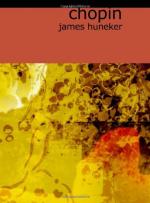Further on I shall attempt—I write the word with a patibulary gesture—in a sort of a Chopin variorum, to analyze the salient aspects, technical and aesthetic, of his music. To translate into prose, into any language no matter how poetical, the images aroused by his music, is impossible. I am forced to employ the technical terminology of other arts, but against my judgment. Read Mr. W. F. Apthorp’s disheartening dictum in “By the Way.” “The entrancing phantasmagoria of picture and incident which we think we see rising from the billowing sea of music is in reality nothing more than an enchanting fata morgana, visible at no other angle than that of our own eye. The true gist of music it never can be; it can never truly translate what is most essential and characteristic in its expression. It is but something that we have half unconsciously imputed to music; nothing that really exists in music.”
The shadowy miming of Chopin’s soul has nevertheless a significance for this generation. It is now the reign of the brutal, the realistic, the impossible in music. Formal excellence is neglected and programme-music has reduced art to the level of an anecdote. Chopin neither preaches nor paints, yet his art is decorative and dramatic—though in the climate of the ideal. He touches earth and its emotional issues in Poland only; otherwise his music is a pure aesthetic delight, an artistic enchantment, freighted with no ethical or theatric messages. It is poetry made audible, the “soul written in sound.” All that I can faintly indicate is the way it affects me, this music with the petals of a glowing rose and the heart of gray ashes. Its analogies to Poe, Verlaine, Shelley, Keats, Heine and Mickiewicz are but critical sign-posts, for Chopin is incomparable, Chopin is unique. “Our interval,” writes Walter Pater, “is brief.” Few pass it recollectedly and with full understanding of its larger rhythms and more urgent colors. Many endure it in frivol and violence, the majority in bored, sullen submission. Chopin, the New Chopin, is a foe to ennui and the spirit that denies; in his exquisite soul-sorrow, sweet world-pain, we may find rich impersonal relief.
V. POET AND PSYCHOLOGIST
Music is an order of mystic, sensuous mathematics. A sounding mirror, an aural mode of motion, it addresses itself on the formal side to the intellect, in its content of expression it appeals to the emotions. Ribot, admirable psychologist, does not hesitate to proclaim music as the most emotional of the arts. “It acts like a burn, like heat, cold or a caressing contact, and is the most dependent on physiological conditions.”
Music then, the most vague of the arts in the matter of representing the concrete, is the swiftest, surest agent for attacking the sensibilities. The cry made manifest, as Wagner asserts, it is a cry that takes on fanciful shapes, each soul interpreting it in an individual fashion. Music and beauty are synonymous, just as their form and substance are indivisible.




